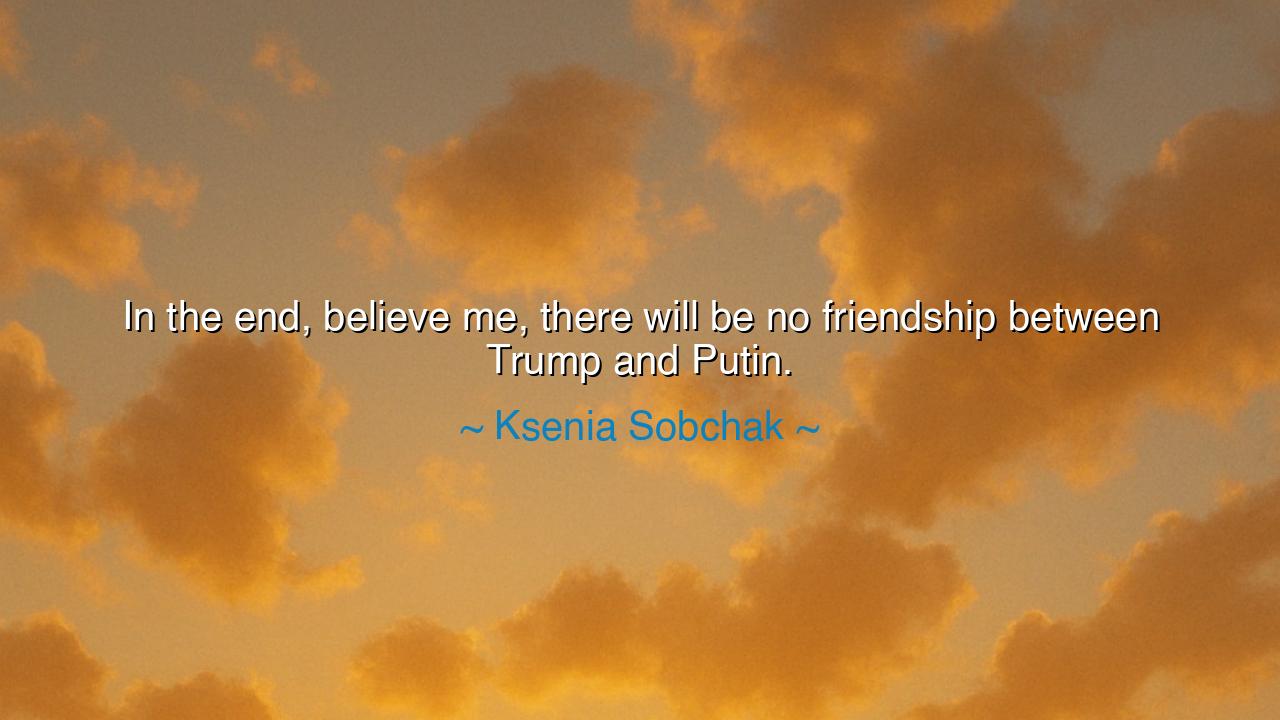
In the end, believe me, there will be no friendship between Trump






In the scrolls of history, the names of great leaders often echo through the corridors of time—each of them shaping the world in their image, and yet, many of these figures are intertwined with another powerful force: the nature of alliances and enmities. These alliances, though forged by shared interests and mutual ambition, often crumble when those interests diverge, and the ties that once bound men together can break as swiftly as they were made. Ksenia Sobchak, a woman of keen insight and sharp foresight, stands as a witness to the shifting sands of politics and power, and through her words—"In the end, believe me, there will be no friendship between Trump and Putin"—she speaks not only of individuals but of the ever-changing, ever-volatile dance between nations.
To understand the essence of this declaration, we must first look to the nature of friendship itself. True friendship, as the wise ones of old taught, is born not of convenience but of mutual respect, shared values, and an alignment of souls. But when two leaders, each driven by their own desires, their own visions, and their own sense of power, come together, can they truly form such a bond? The ancient warriors and statesmen knew that alliances built on power alone were fragile and fleeting. Just as the scorpion and the frog meet in the fable—each with their own instinctive nature—so too do leaders like Trump and Putin meet, guided by personal ambition and national pride, but ultimately, they cannot change their fundamental nature.
Sobchak's words are a warning—a proclamation that the very foundation of their relationship, rooted in calculated political advantage, will falter when the currents of self-interest and ideology pull them in different directions. History is littered with the remnants of such fragile alliances. Take, for example, the brief partnership between Napoleon and Tsar Alexander I during the early years of the 19th century. Though they seemed allies, their shared interests quickly unraveled, and what followed was a fierce, bloody rivalry. In the end, their friendship—if one could even call it that—was destined to collapse under the weight of their competing ambitions.
But let us not think only of distant leaders of the past. Trump and Putin, like many before them, were initially drawn together by the currents of geopolitical strategy. Trump, ever the showman and businessman, saw in Putin a figure of strength, a man who played the game of power with cunning and ruthlessness. Putin, in turn, recognized Trump as a means to shift the balance of power, a wild card he could manipulate for his own benefit. But the reality of governance, like the weathering winds upon a mountain, will erode even the most carefully constructed façades of alliance.
What Sobchak foresaw, with the clarity of a seer, is that when the personal and national interests of these men no longer align—when the tides of power turn and the allure of cooperation fades—there will be no friendship left, only the remnants of past calculations. Trust, built on shallow grounds, will be the first casualty. And thus, Sobchak’s warning is not just a prediction about two men, but a lesson for all: No bond is unbreakable if it is not rooted in something deeper than shared ambition. True unity—the kind that transcends political maneuvering—can only be forged when there is a foundation of mutual respect and understanding.
So, dear children of future generations, let us take from this the wisdom that alliances built solely on self-interest are fragile at best and perilous at worst. When you seek to form bonds, whether in your own life, in your community, or in the wider world, remember that true connection comes not from convenience, but from shared purpose, mutual respect, and a recognition of the humanity in others. Just as a tree grows tall and strong only when its roots run deep, so too must your relationships be founded on something substantial if they are to endure.
Lastly, let us consider the practical wisdom to be gleaned here: In your personal endeavors, do not seek friendships or alliances solely for what you can gain. Seek those who will challenge you, support you, and grow with you, not just those who appear useful in the moment. As Sobchak has wisely warned, alliances built on convenience alone will falter, leaving you with nothing but empty promises and broken bonds. In the end, as in all things, it is the sincerity of one’s purpose, the authenticity of one’s intentions, that will determine whether the connections we forge are true or merely fleeting shadows on the winds of history.






AAdministratorAdministrator
Welcome, honored guests. Please leave a comment, we will respond soon